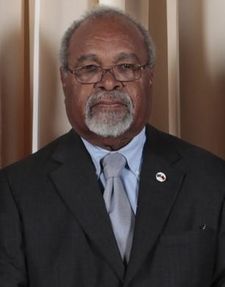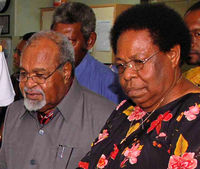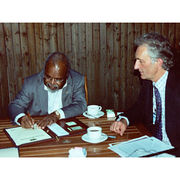Michael Somare
| The Right Honourable Grand Chief Sir Michael Somare GCL GCMG CH CF KStJ SSI KSG MP |
|
 Michael Somare in 2009 |
|
|
Prime Minister of Papua New Guinea
|
|
|---|---|
| Incumbent | |
| Assumed office 05 August 2002 |
|
| Monarch | Elizabeth II |
| Governor General | Silas Atopare Bill Skate Jeffrey Nape Paulias Matane |
| Preceded by | Mekere Morauta |
| In office 02 August 1982 – 21 November 1985 |
|
| Monarch | Elizabeth II |
| Governor General | Tore Lokoloko Kingsford Dibela |
| Preceded by | Julius Chan |
| Succeeded by | Paias Wingti |
| In office 16 September 1975 – 11 March 1980 |
|
| Monarch | Elizabeth II |
| Governor General | John Guise Tore Lokoloko |
| Preceded by | Office created |
| Succeeded by | Julius Chan |
|
|
|
| Born | 9 April 1936 Rabaul, New Britain |
| Political party | NAP |
| Spouse(s) | Veronica Somare |
| Religion | Roman Catholic[1] |
Sir Michael Thomas Somare, GCL, GCMG, CH, CF, KStJ, MP (born 9 April 1936) has been Prime Minister of Papua New Guinea since 2002; he was previously Prime Minister from independence in 1975 until 1980 and again from 1982 until 1985. Somare's first two terms were as a member of the Pangu Party, but he is now leader of the National Alliance Party. He was re-elected as Prime Minister in the 2007 election.
Contents |
Early life
Somare was the son of Ludwig Somare Sana and Kambe Somare. Ludwig Somare was a policeman from 1922 to 1947, rising to the rank of sergeant. Having taught himself to read and write, he was subsequently active in encouraging formation of small businesses and co-operatives, founding the Angoram Co-operative Society which he chaired from 1961 until 1967, and remaining active in trading until his death in 1972. In all he had four wives and six children, of whom Somare was the eldest.
Born in Rabaul where his father was then stationed, Somare grew up in his family village of Karau in the Murik Lakes district of East Sepik Province. Somare's earliest education was in a Japanese-run primary school at Karau during World War II where he learned to read, write and count in Japanese. Meanwhile Somare's father was in hiding and fear of his life from the Japanese in Rabaul, but he remembers the Japanese with affection. Somare's earliest overseas trips, first as a parliamentarian and then as Prime Minister, were to Japan.
From 1946 Somare attended Boram Primary School, then Dregerhafen Education Centre and Sogeri High School, graduating with a Leaving Certificate issued on behalf of the Australian state of Victoria in 1957. This was a teaching qualification at the time, and he then taught at several primary and secondary schools, returning to Sogeri High School for further training from 1962 to 1963.
Political life and the beginning of the PNG Independence movement
Early life in the independence movement
Transferring within the Public Service, Somare became a radio broadcaster based in Wewak in the East Sepik Province. He received further training at the Administrative College at Waigani in 1965. Following numerous conflicts with his superiors concerning his outspoken political comments, he was transferred from broadcasting to administrative roles, and left the Public Service to contest the elections for the second House of Assembly in 1968 as a member of the Pangu Party which he had founded with other like minds in 1967.
Somare and eight other Pangu Party members were elected. They declined invitations to join the coalition government, and he became the first official opposition leader. Following the third House of Assembly elections in 1972, He was able to form a coalition government which included Julius Chan of the People's Progress Party, himself later a Prime Minister, as Minister for Internal Finance. Somare became Chief Minister when self-government was granted in 1973, and was a key figure in the preparations for subsequent independence in 1975 and the preparation and adoption of the Constitution.
First and further terms as prime minister
With independence, Somare's title changed to Prime Minister.
Ousted by a parliamentary vote of no confidence in 1980, Somare was again Prime Minister from 1982 until 1985, and won the office a third time in the 2002 election. He was re-elected again in 2007, becoming the first and so far only Prime Minister to complete a parliamentary term and win re-election.
Sepik identity
Somare has always had an interest and a pride in his background and culture. Although his initiations were interrupted several times by his career, he returned to his village regularly and completed them, culminating in his appointment as sana or peacemaker, a title inherited from his father and grandfather and conferred on him by his uncle Saub in 1973. Somare often chose to wear quasi-Melanesian rather than western dress -- a lap-lap -- in parliament and on similar occasions, and in many old photographs is the only political leader attired in a lap-lap rather than trousers. At the time of Papua New Guinea independence in 1975 Somare demanded proper dignity for Papua New Guinean leaders when he considered that Australia's gift of an official house for Papua New Guinea's prime minister was insufficiently grand for the great statesman he considered himself to be: Australia abashedly acceded to Somare's demands and provided a much more palatial official residence; the intended and despised prime ministerial residence was instead designated the residence of the Australian High Commissioner.
Somare's political style was both fiercely nationalistic and purportedly conciliatory, following the tradition of Sana as he professed to see it. One of the roles of Sana is to invite enemies to a feast before any fight. Somare often appointed political enemies to posts in which they could exercise their interests and passions. In the lead-up to independence, Somare argued for and won citizenship and residency requirements which were both more severe than the outgoing Australian administration recommended and more moderate than most of his party wished.
His autobiography Sana (1975), Somare lists many anecdotes. He tells how in 1971, he was concerned that the sacred objects, the ornately carved sacred spears or kakars and the sacred flutes, were being lost, destroyed, sold or stolen. After much negotiation with the gapars or priests he arranged to have the kakars of his village photographed. The kakars were only handled by the senior gapars, and only left or "came down" from the haus tambaran on the occasion of the gapars handing over the priestly function to another orob or generation. Somare himself was too young to be allowed to even see the kakars, but was included into the coming down ceremony as the interpreter for the photographer, who was of a suitable age to be attached to the next orob. Only after the ceremony was complete did he realise the significance of the sacrifice made by the older priests to allow these photographs to be taken. Over the following days they completed the initiation of the new orob, thus denying themselves the privilege of serving as gapars ever again.
Reflecting these interests, in 1969 Somare was appointed chairman of the board of trustees of the Papua and New Guinea Museum. The Grand Chief has not necessarily taken a notable interest in the Museum, however, which has fallen into serious decrepitude since Independence.
Personal life

Somare married his wife Veronica, Lady Somare (generally referred to as "Lady Veronica Somare") in 1965, having courted her in traditional fashion, and then immediately left to take up his scholarship at Administrative College. They have five children, Bertha (usually called "Betha" in the national press), Sana, Arthur, Michael Jnr and Dulciana. Somare is head of both his own family and that of his wife, Veronica Lady Somare, who initiated him into their title mindamot two days after his initiation as sana. Somare, together with the now-Governor-General Sir Paulias Matane, makes a point of wearing a lap-lap rather than trousers.
Later political life
Between Prime Ministerships
During the seventeen years between his second and third terms as Prime Minister, Somare was appointed to political posts by other Prime Ministers. Somare served as Foreign Minister from 1988 to 1992 in the government of Rabbie Namaliu, who would later become Foreign Minister in his own subsequent government. Somare later served as Foreign Minister for a few months in 1999 and took this position again in July 2006. Somare is currently the Prime Minister. His probity has frequently been called into question. Professor James Chin of Monash University writes:
- On the issue of corruption and tax evasion, clear evidence exists from the 1980s.The infamous Thomas [Barnett] Commission in 1989 laid out in excruciating detail how [Rimbunan Hijau] and its agents systematically paid off PNG politicians who threatened their logging operations. Even current Prime Minister Michael Somare was implicated in the report. He was referred to the Ombudsman Commission for allegedly lying under oath about a logging concession held by the Sepik River Development Corporation (SRDC) in East Sepik Province. The Commission report also gave details of transfer pricing to escape taxes worth millions of Kina.[2]
Latter statesmanship
Shoes episode
In March 2005 Somare was required by security officers at Brisbane Airport, Australia, to remove his shoes during a routine departure security check and took strong exception to what he considered a mighty personal and national humiliation verging on blasphemy, leading to a diplomatic contretemps and a significant cooling of relations between Australia and Papua New Guinea. A protest march in Port Moresby saw hundreds march on the Australian High Commission demanding an apology and compensation.[3] However the Australian Government ignored the matter. Somare now avoids Australia and obtains medical treatment, when necessary, in Malaysia. Since Kevin Rudd came to power in Australia, relations have improved, because Somare believes that Rudd understands the Papua New Guineans better than his predecessors and is therefore easier to talk to.[4]
Moti affair
Tensions between Papua New Guinea and Australia worsened during the course of the Julian Moti affair, in which Somare was implicated. Moti, a close associate of Manasseh Sogavare, the Prime Minister of the Solomon Islands, was arrested in Port Moresby on 29 September 2006 under an Australian extradition request to face child sex charges over an alleged incident in Vanuatu in 1997. After breaking bail conditions and taking sanctuary in the Solomon Islands High Commission, he was flown to the Solomon Islands on a clandestine PNG Defence Force flight on the night of October 10, causing outrage on the part of the Australian government. Australia then cancelled ministerial-level talks in December and banned senior Papua New Guinea ministers from entering Australia. Somare denied any involvement in authorising the flight.[5]
Fifty kina note
Somare's face appears on the face of the PNG fifty-kina note. This is due to the fact that Somare led the country to independence in 1975 and then served as founding Prime Minister. It has reportedly been perceived, some 15 years ago, that Somare is the King of Papua New Guinea.[6]
2007 election
Following the 2007 parliamentary election, Somare was re-elected as Prime Minister on August 13 with the support of 86 out of the 109 Members of Parliament.[7]
In March 2008, however, at the age of 71, Somare announced he would soon be stepping down from his position as Prime Minister, and ending his political career. He explained that, after forty years in politics, he simply "need[ed] a change" ("I don't think I have lost anything but the time has come")[8]. In September 2008, Somare once again hinted at his upcoming retirement.[9] Somare remains in power.
Coalition for Rainforest Nations

On the international stage, Papua New Guinea has become noteworthy in climate negotiations, leading the Coalition for Rainforest Nations in proposals to include carbon credits for reduced emissions from deforestation (REDD) in the post-2012 international climate change agreement. Somare has personally endorsed the Forests Now Declaration, calling for this and other new market based mechanisms to protect forests.
Honours
Somare has received several honorary doctorates, the first being from the University of the Philippines in 1976. Somare was appointed a member of Her Majesty's Most Honourable Privy Council in 1977 (as in Australia, the honorific "The Right Honourable" can only be granted when one is admitted to the British Privy Council), and was made a Knight Grand Cross of the Order of St Michael and St George (GCMG) by the Queen in the Birthday Honour List of 1990.) In 2004 he received authorization from cabinet to create an honours system for Papua New Guinea. In 2005, the Princess Royal invested him as one of the first Grand Companions of the Order of Logohu (GCL).
Awards
Commonwealth Honours
| Country | Award or Order | Class or Position | Dates | Citation |
|---|---|---|---|---|
| Papua New Guinea | Papua New Guinea Independence Medal | - | 1975 | |
| United Kingdom | Privy Council of the United Kingdom | Privy Councilor | 1977 | [1] |
| United Kingdom | Order of the Companions of Honour | Companion of Honour | 1978 | [2] |
| United Kingdom | Order of St Michael and St George | Knight Grand Cross | 1991 | [3] |
| Papua New Guinea | Papua New Guinea 30th Anniversary of Independence Medal | - | 2004? | |
| Papua New Guinea | Order of Logohu | Grand Commander | 2005 | |
| Fiji | Order of Fiji | Companion | year unknown (2005?) | [4] |
| United Kingdom (Royal Order) | Venerable Order of Saint John | Knight of Justice | year unknown | [5] |
Foreign Honours
| Country | Award or Order | Class or Position | Dates | Citation |
|---|---|---|---|---|
| Vatican City | Order of St. Gregory the Great | Knight | 1992 |
| Political offices | ||
|---|---|---|
| Preceded by Office created |
Chief Minister of Papua and New Guinea 1972–1975 |
Succeeded by Himself As Prime Minister |
| Preceded by Himself As Chief Minister |
Prime Minister of Papua New Guinea 1975–1980 |
Succeeded by Julius Chan |
| Preceded by Julius Chan |
Prime Minister of Papua New Guinea 1982–1985 |
Succeeded by Paias Wingti |
| Preceded by Mekere Morauta |
Prime Minister of Papua New Guinea 2002–present |
Incumbent |
References
- ↑ Jeffrey Clark, "Imagining the State, or Tribalism and the Arts of Memory in the Highlands of Papua New Guinea", in Ton Otto & Nicholas Thomas (eds.), Narratives of Nation in the South Pacific, Amsterdam:Harwood Academic Publishers, 1997, ISBN 90-5702-086-6, p.82
- ↑ James Chin (2008), “Contemporary Chinese Community in Papua–New Guinea: Old Money versus New Migrants,” Chinese Southern Diaspora Studies, Volume Two,120-121.
- ↑ "PNG rally against Australia's treatment of PM Somare". Radio New Zealand International. http://www.rnzi.com/pages/news.php?op=read&id=15801. Retrieved 2007-08-02.
- ↑ Sir Michael Somare Interview
- ↑ "PNG report says PM Somare should be charged over Moti escape". Radio New Zealand International. http://www.rnzi.com/pages/news.php?op=read&id=33672. Retrieved 2007-08-02.
- ↑ The Papua New Guinea Post-Courier, Tuesday, 30 January 1996; The National, Tuesday, 30 January 1996.
- ↑ "Papua New Guinea PM re-elected", Al Jazeera, August 13, 2007.
- ↑ "PNG PM to step down after 40 year career", Sydney Morning Herald, March 16, 2008
- ↑ "PNG's prime minister 'ready to leave' politics", ABC Radio Australia, September 29, 2008
External links
- Prime Minister's office
- "Somare - A political survivor", Rowan Callick, Islands Business, May 2008
|
|||||||
|
|||||